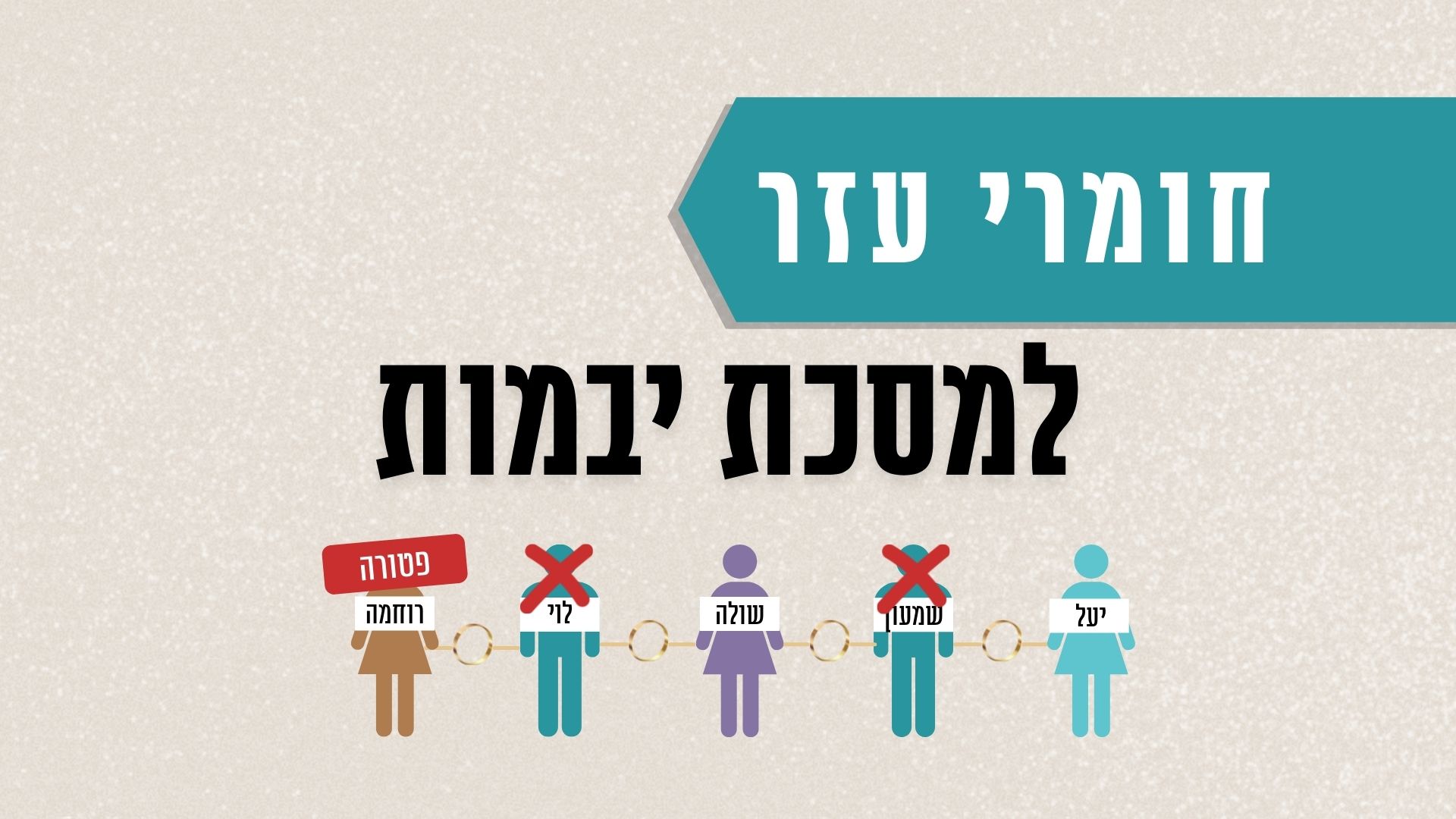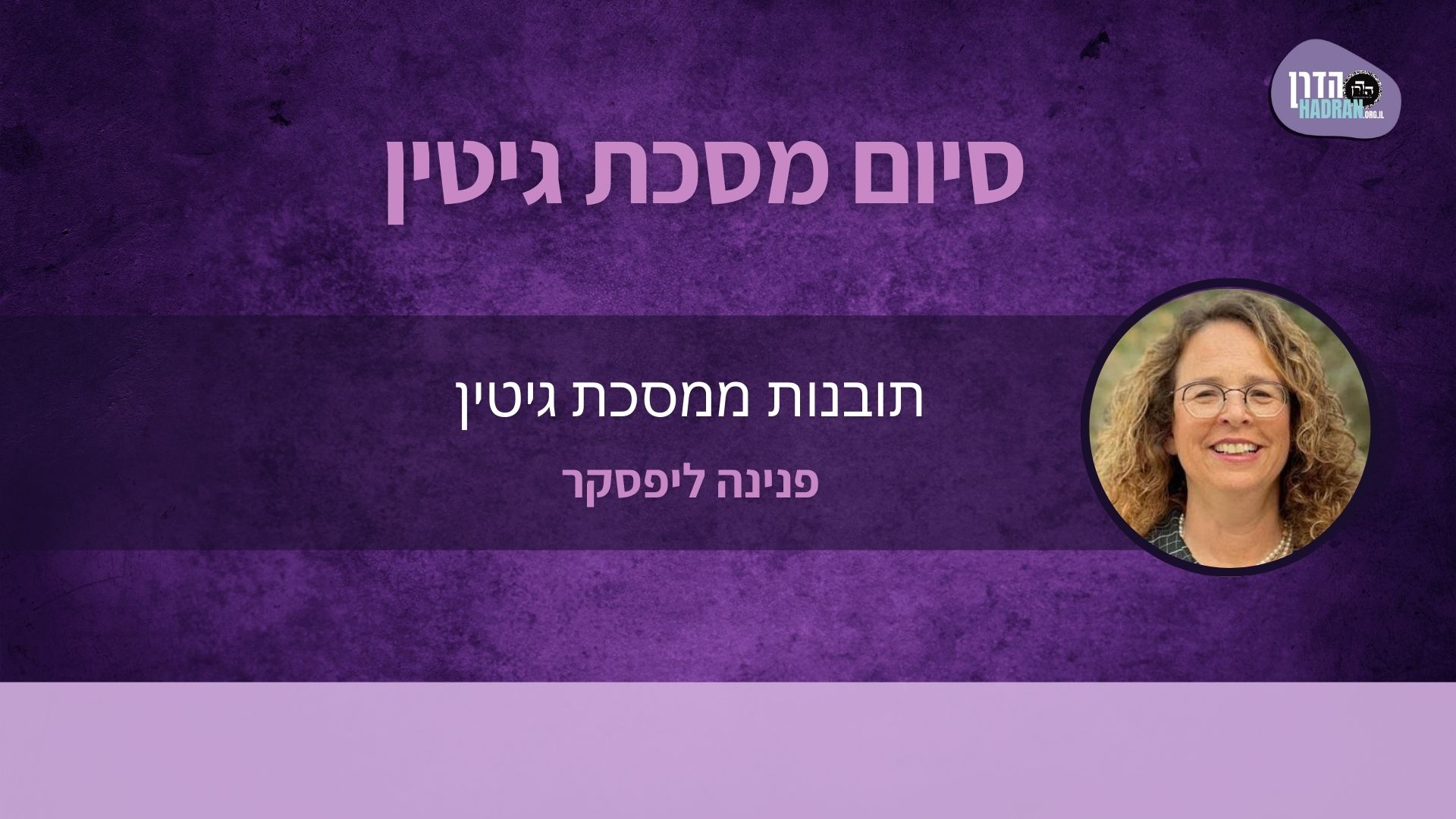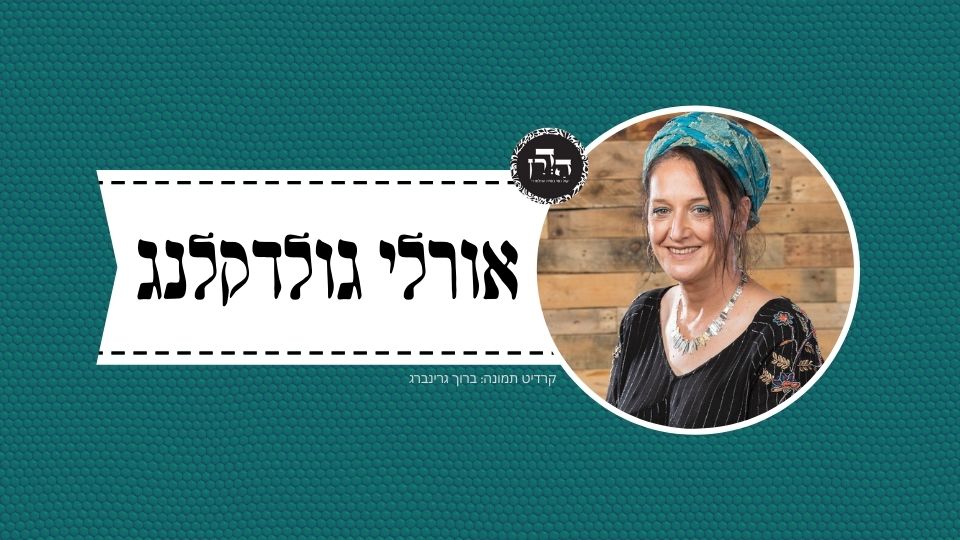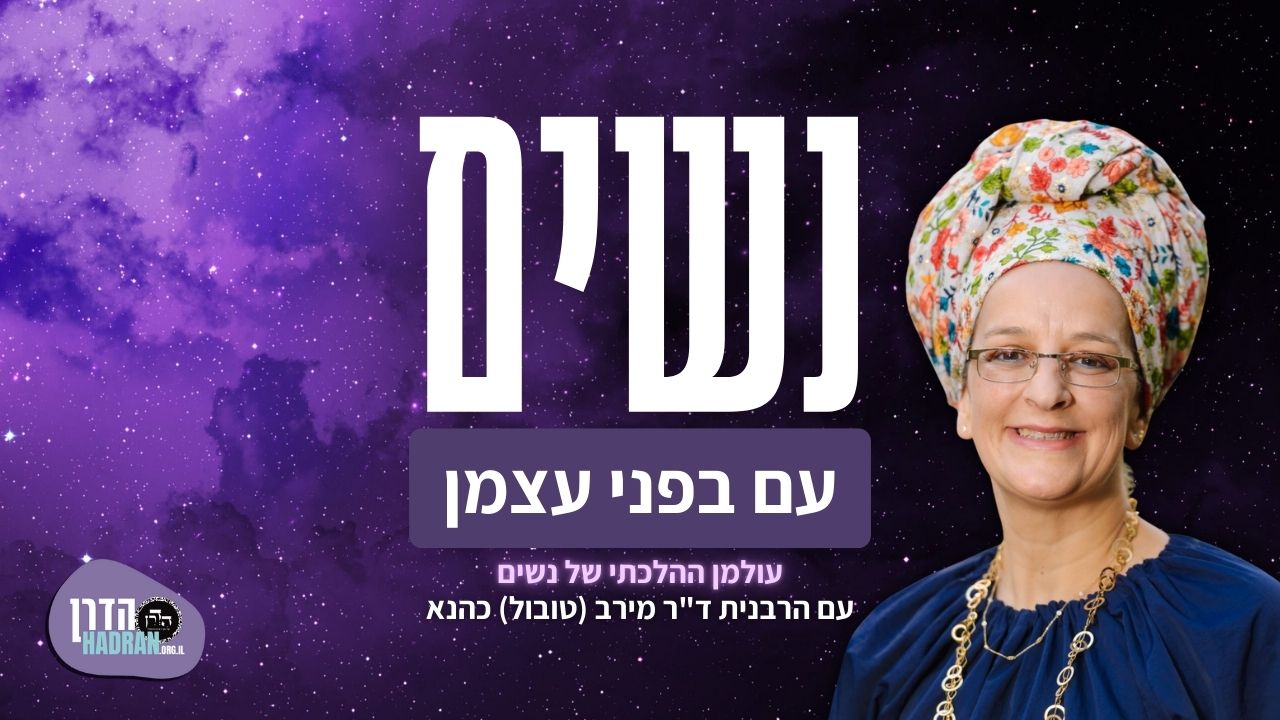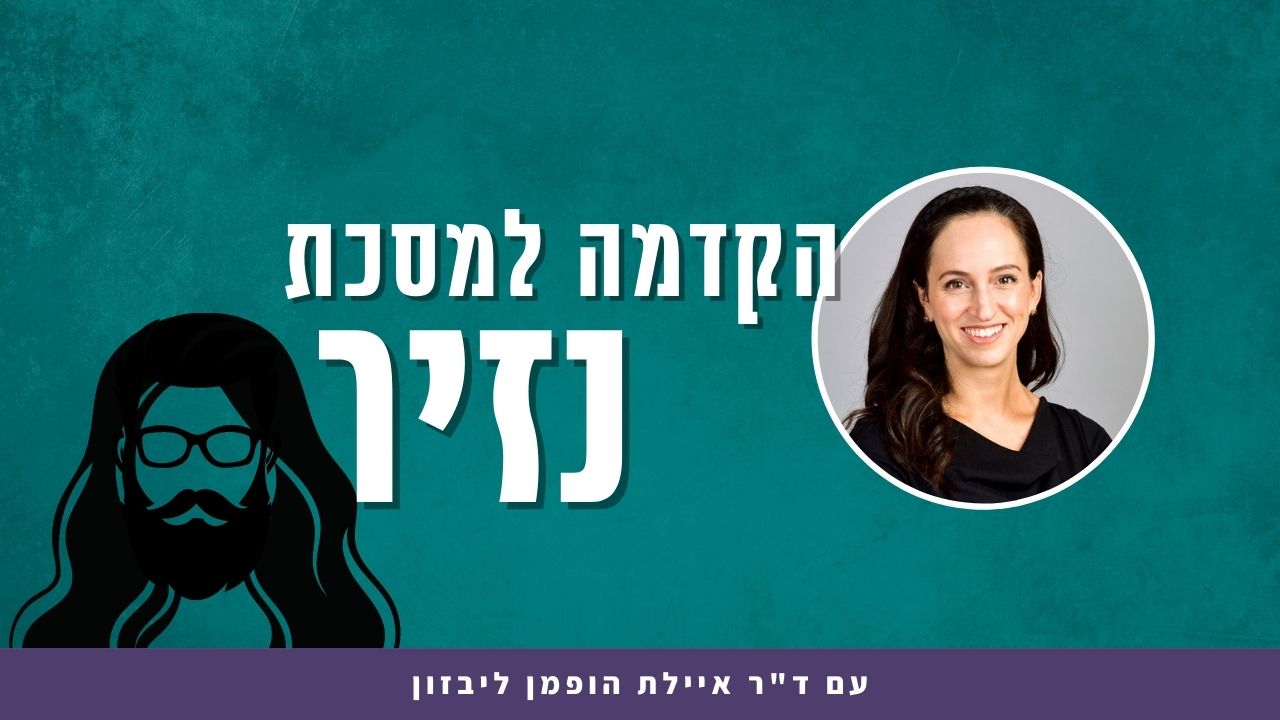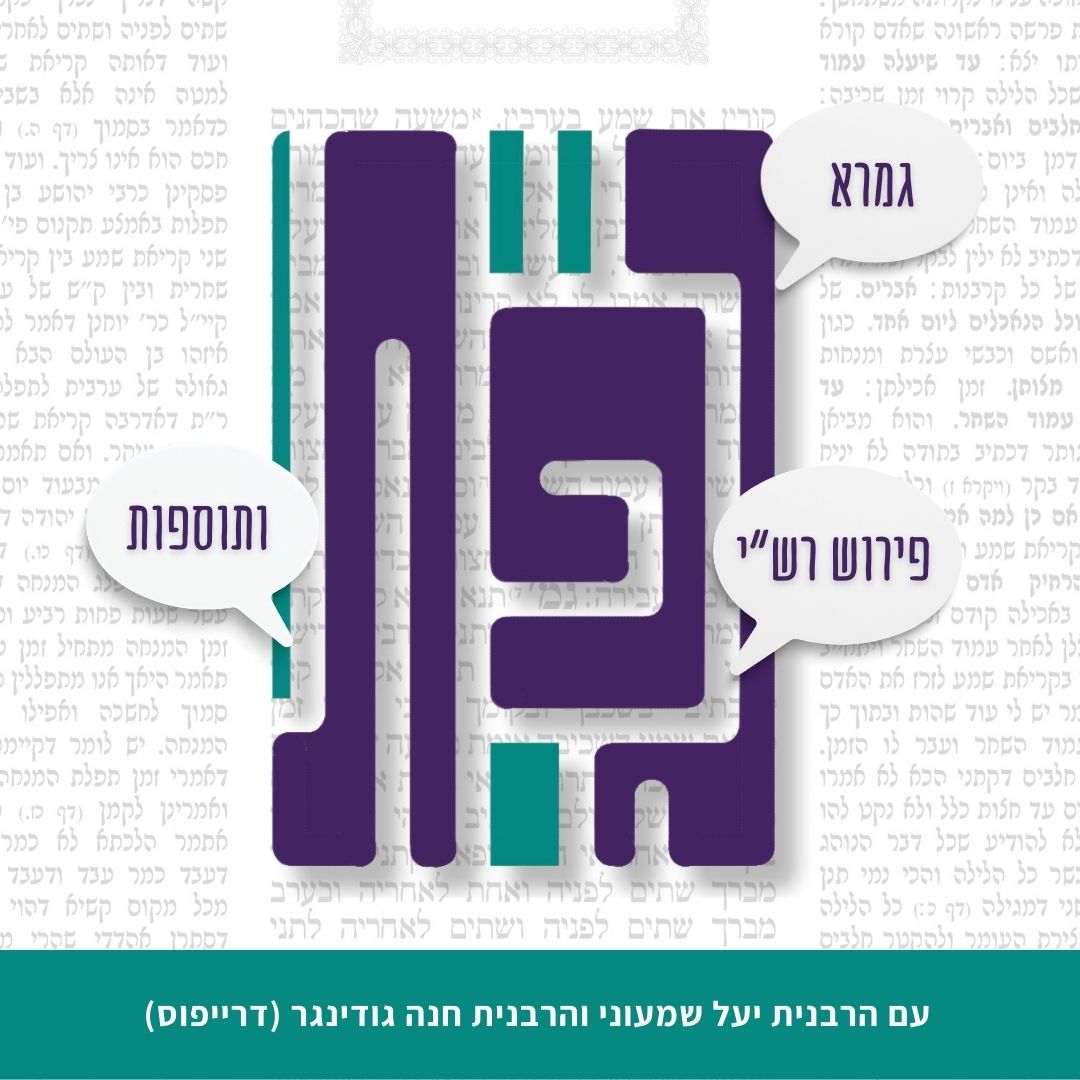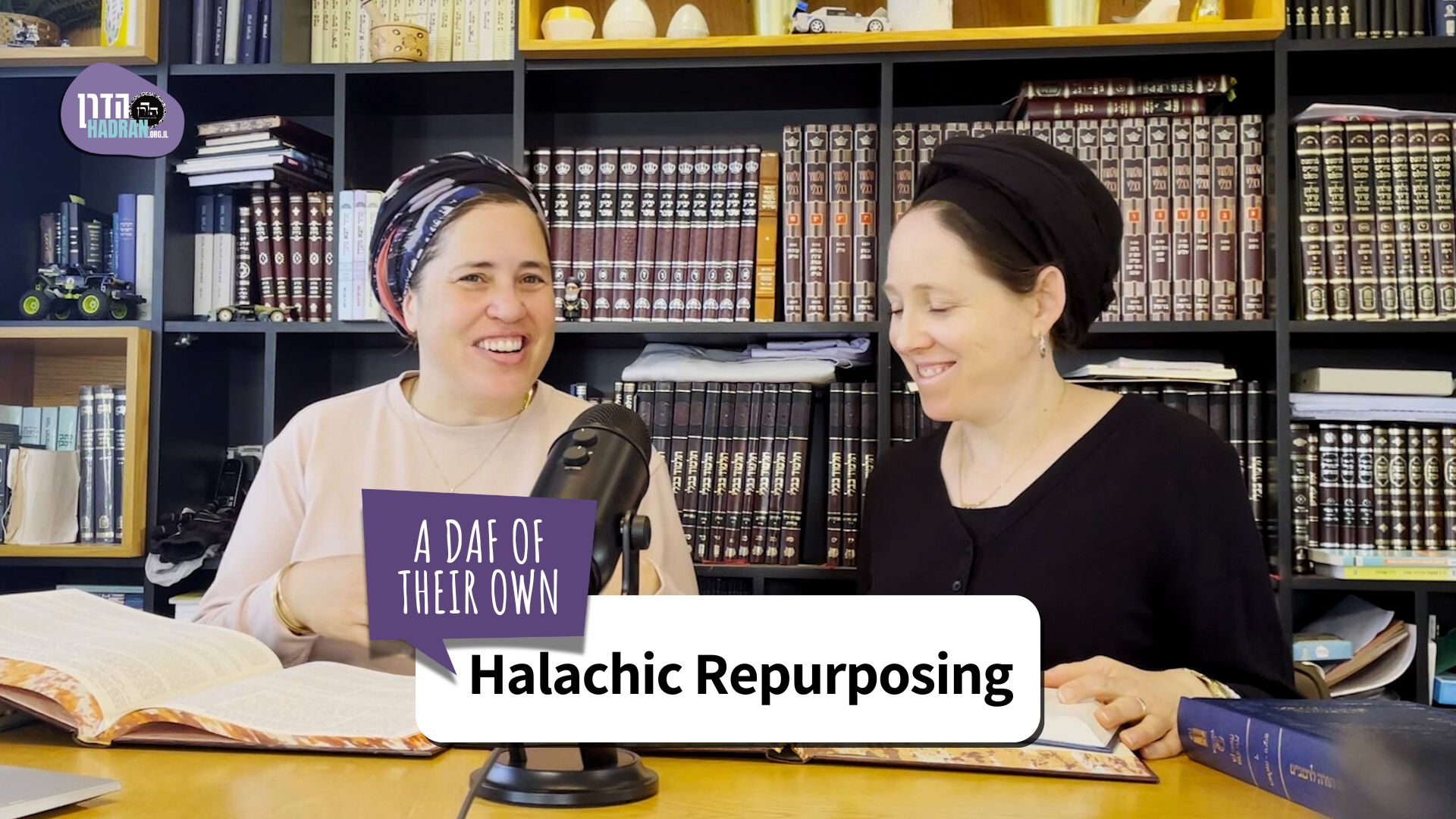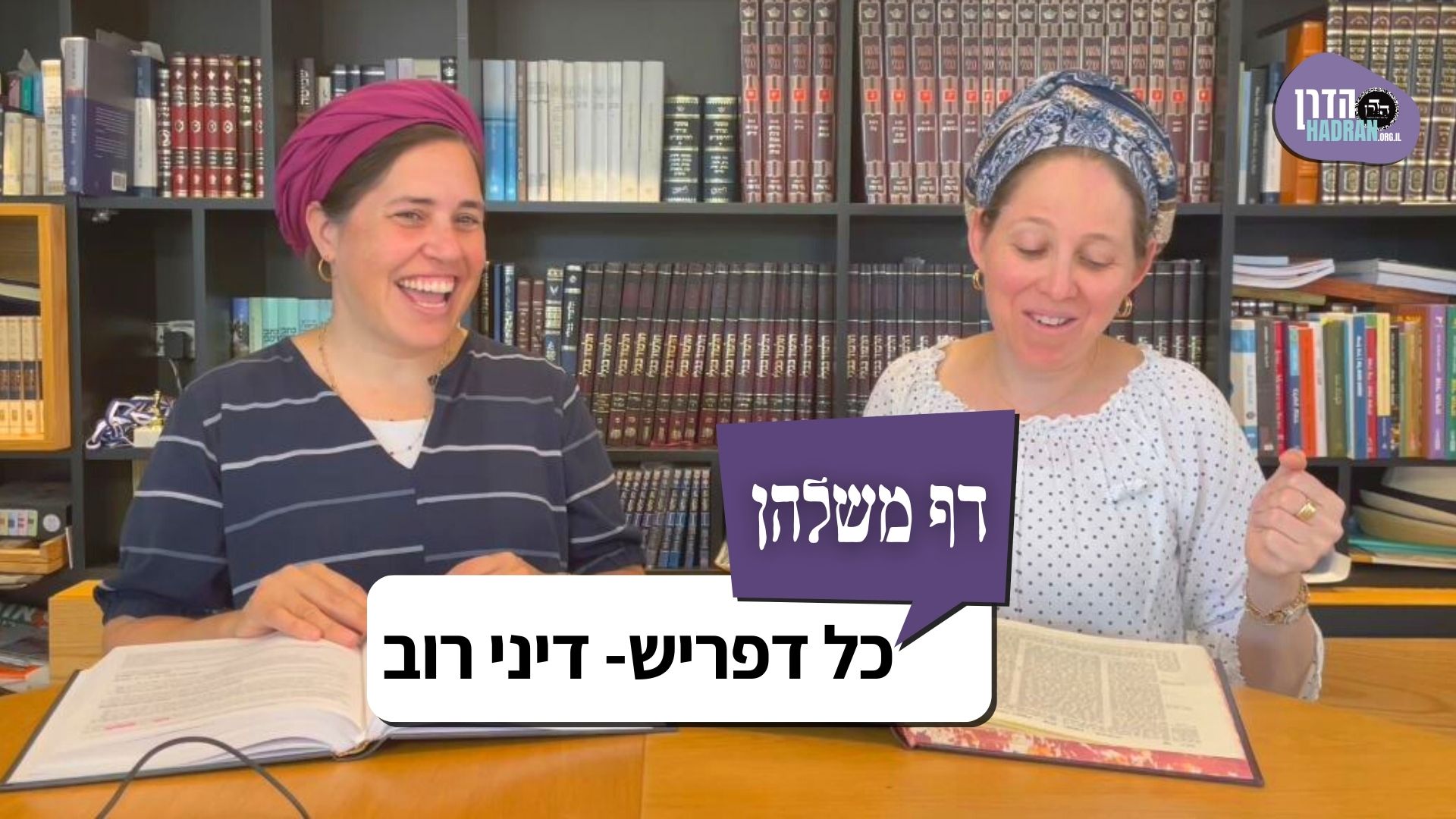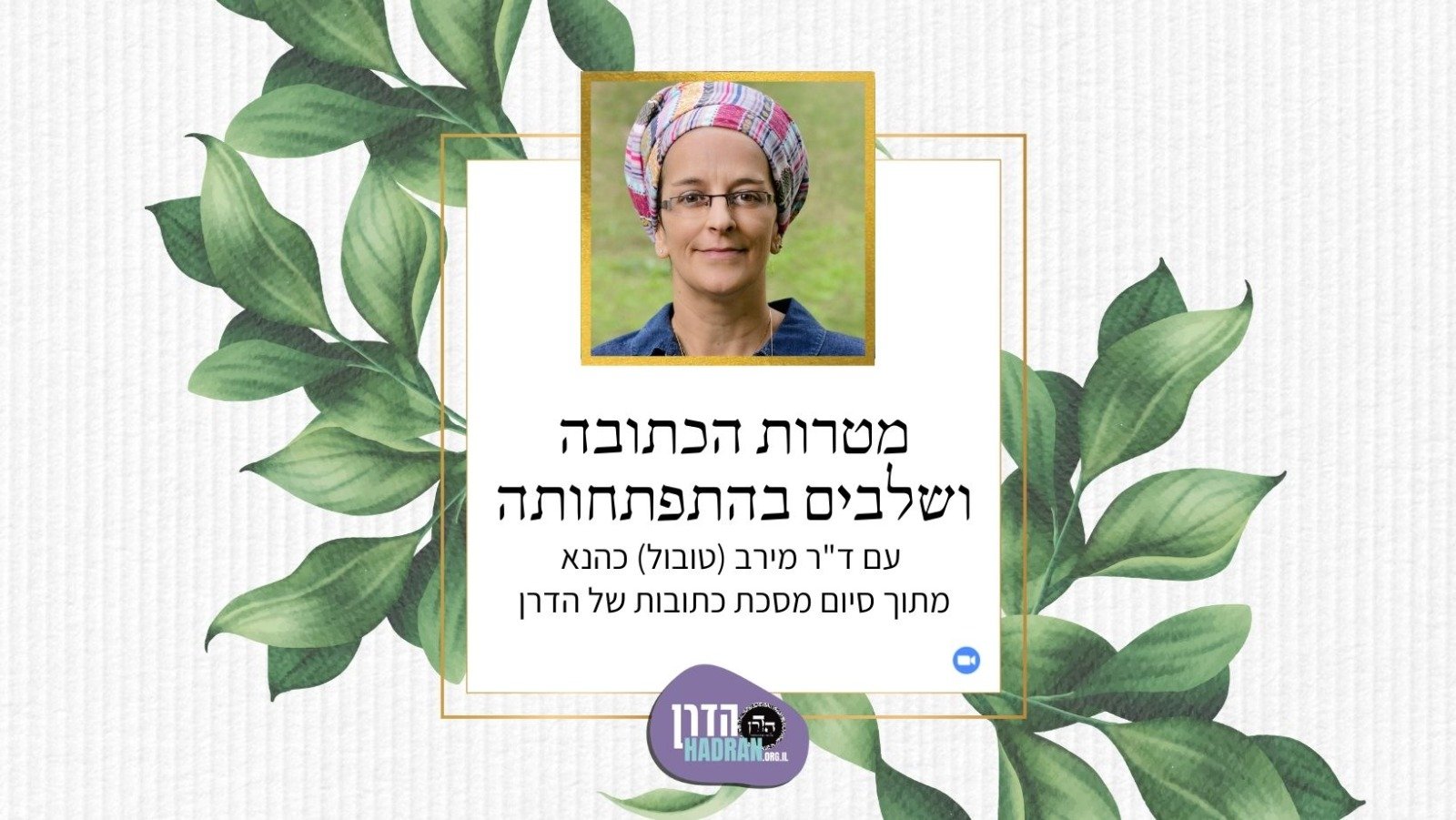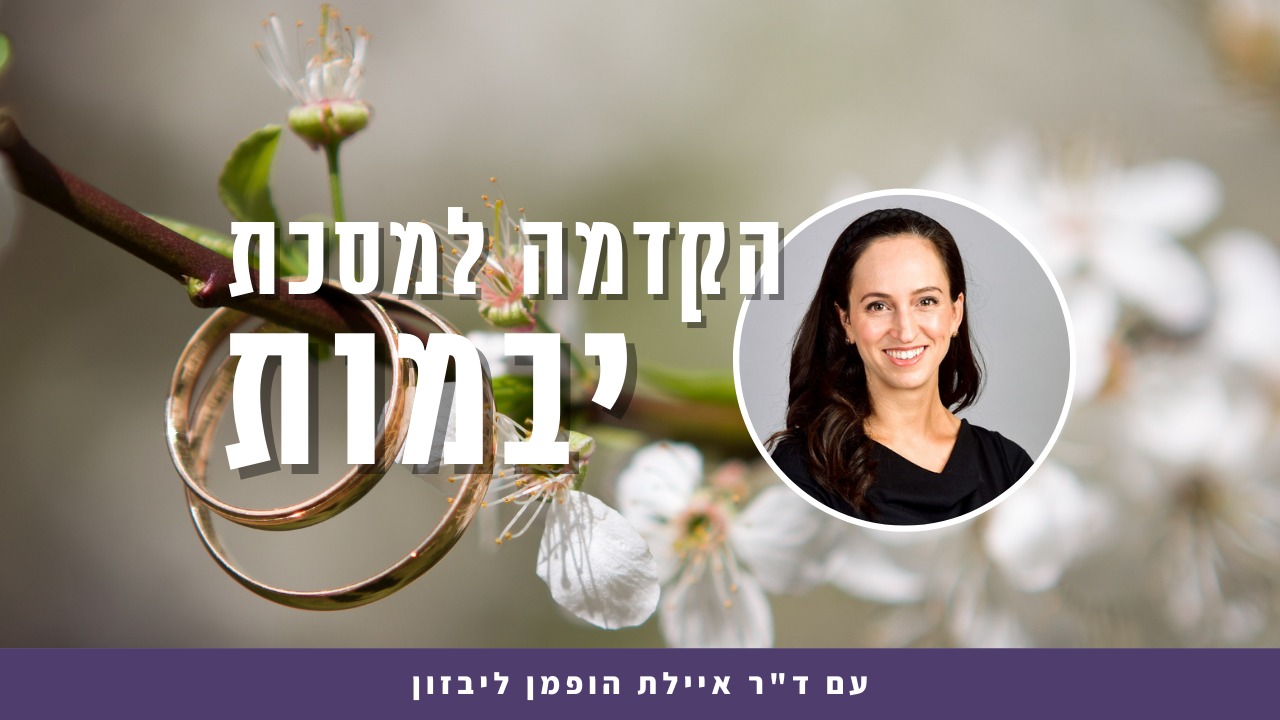אם מישהו אחר מביא את הבהמה למתכפר, מי נחשב בעל הקרבן לעניין שבעל הקרבן צריך להוסיף חומש במקרה שפודה, ומי נחשב בעל הקרבן לעניין תמורה? אם ממירים אברים או עוברים, האם זה עובד? האם אפשר להקדיש עובר קדושת הגוף?

כלים
הלימוד החודש מוקדש לרפואת פיליס הכט, גיטל פעשא בת מאשה רחל על ידי חברותיה הרבות שאוהבות ומעריכות אותה.
כלים
העמקה
רוצה להבין מה באמת קורה מתחת לפני השטח של הסוגיה?
שיעורים, פודקאסטים והרחבות של מיטב המורות שלנו יפתחו לך עוד זוויות וכיווני חשיבה.
חדשה בלימוד הגמרא?
זה הדף הראשון שלך? איזו התרגשות עצומה! יש לנו בדיוק את התכנים והכלים שיעזרו לך לעשות את הצעדים הראשונים ללמידה בקצב וברמה שלך, כך תוכלי להרגיש בנוח גם בתוך הסוגיות המורכבות ומאתגרות.
פסיפס הלומדות שלנו
גלי את קהילת הלומדות שלנו, מגוון נשים, רקעים וסיפורים. כולן חלק מתנועה ומסע מרגש ועוצמתי.
תמורה י
אוֹ דִילְמָא: כׇּל אוֹתָהּ קְדוּשָּׁה אֵינוֹ מוֹסִיף חוֹמֶשׁ?
Or perhaps we say that if one redeems any animal that possesses the same sanctity as the original he does not add an additional one-fifth.
וְאִם תִּימָּצֵא לוֹמַר הָדֵין גּוּף (אֶחָד) [אַחֵר], כֵּיוָן דִּבְאוֹתָהּ קְדוּשָּׁה קָאֵים [אֵינוֹ] מוֹסִיף חוֹמֶשׁ, אֶלָּא נִתְכַּפֵּר בְּאַחֵר, וְנִיתַּק זֶה לְעוֹלָה — מַהוּ? כִּי [אֵינוֹ] מוֹסִיף חוֹמֶשׁ בְּאוֹתוֹ הַגּוּף בְּאוֹתָהּ קְדוּשָּׁה, אֲבָל בִּקְדוּשָּׁה אַחֶרֶת — לָא? אוֹ דִילְמָא, כֵּיוָן דְּאוֹתוֹ הַגּוּף הוּא — [אֵינוֹ] מוֹסִיף חוֹמֶשׁ? תֵּיקוּ.
And if you say that with regard to this other body, since it maintains the same type of sanctity as the initial animal, one does not add one-fifth when redeeming it, but what of a case where the first animal was lost and the owner achieved atonement by bringing another, and this first animal was found and was consigned to be sacrificed as a burnt offering? What is the halakha? Do we say that when one does not add an additional one-fifth, that is only with regard to the same body with the same type of sanctity, but in the case of another type of sanctity the exemption does not apply? Or perhaps we say that since it is the same body, one does not add one-fifth. The Gemara concludes: The dilemma shall stand unresolved.
בָּעֵי רָמֵי בַּר חָמָא: מַקְדִּישׁ מוֹסִיף חוֹמֶשׁ, אוֹ (מכפר) [מִתְכַּפֵּר] מוֹסִיף חוֹמֶשׁ? אָמַר רָבָא: אָמַר קְרָא ״וְאִם הַמַּקְדִּישׁ יִגְאַל אֶת בֵּיתוֹ״ — מַקְדִּישׁ, וְלֹא מִתְכַּפֵּר.
Rami bar Ḥama raises a dilemma: If one person consecrates his animal to be used as an offering by another, does the one who consecrates it add one-fifth when he redeems it, or does the one atoning by means of the offering add one-fifth? Who is considered the owner of the offering? Rava said that the verse states: “And if he that consecrated it will redeem his house, then he shall add the fifth part of the money” (Leviticus 27:15). It may be inferred from here that only the one who consecrates the item adds one-fifth, but not the one for whom the offering atones.
בָּעֵי רָמֵי בַּר חָמָא: מַקְדִּישׁ עוֹשֶׂה תְּמוּרָה, אוֹ מִתְכַּפֵּר עוֹשֶׂה תְּמוּרָה? אָמַר רָבָא: אִם כֵּן, מָצִינוּ צִיבּוּר וְשׁוּתָּפִין עוֹשִׂין תְּמוּרָה, כְּגוֹן דְּשַׁוּוֹ שָׁלִיחַ לְאַקְדּוֹשֵׁי.
Rami bar Ḥama raises a dilemma: If one person consecrates an animal to be used as an offering by another, can the one who consecrates it render another animal a substitute for it, or can the one achieving atonement through it render a substitute for it? Rava said: If it were so, that the one who consecrates it can render a substitute for it, we would find a case where the community or partners can render a substitute for their consecrated animal, for example where they appointed an agent to consecrate an animal for them. The mishna (13a) states that one cannot substitute for consecrated animals belonging to the community or to partners. By contrast, in this case, since only one person consecrated it, he would be able to substitute for it, contrary to the mishna.
וְעוֹד, דְּאָמַר רַב נַחְמָן אָמַר רַב הוּנָא: תָּנָא ״קׇרְבָּנוֹ לַה׳ עַל נִזְרוֹ מִלְּבַד אֲשֶׁר תַּשִּׂיג יָדוֹ״, וְכִי נָזִיר נִידּוֹן בְּהֶשֵּׂג יָד? הָא כֵּיצַד? ״קׇרְבָּנוֹ לַה׳ עַל נִזְרוֹ״ — שֶׁהִפְרִישׁ מִשֶּׁלּוֹ, ״מִלְּבַד אֲשֶׁר תַּשִּׂיג יָדוֹ״ — שֶׁהִפְרִישׁוּ לוֹ אֲחֵרִים.
And furthermore, Rav Naḥman says that Rav Huna says: The Sages taught in a baraita: The verse states: “This is the law of the nazirite who vows, and of his offering unto the Lord for his naziriteship, besides that for which his means suffice; according to his vow which he vows” (Numbers 6:21). But is the offering of a nazirite judged according to his means? The offerings of a nazirite are fixed by the Torah. How is it possible to understand this clause: “Besides that for which his means suffice”? Rather, the clause “his offering unto the Lord for his naziriteship” is referring to a case where he separated an offering from his own animals, whereas the clause “besides that for which his means suffice” is referring to a case where others separated the offering for him. This teaches that designation by others is effective.
לְמַאי הִילְכְתָא? אִילֵּימָא לְעִנְיַן כַּפָּרָה — פְּשִׁיטָא דְּמִכַּפַּר לֵיהּ! אֶלָּא לְעִנְיַן תְּמוּרָה, וְהָכִי קָאָמַר: אַף כְּשֶׁהִפְרִישׁוּ לוֹ אֲחֵרִים — עוֹשֶׂה תְּמוּרָה. שְׁמַע מִינַּהּ: בָּתַר מִתְכַּפֵּר אָזְלִינַן!
With regard to what halakha is this baraita stated? If we say that it is with regard to the matter of atonement, and it is teaching that a nazirite can atone even by means of an offering designated for him by others, isn’t it obvious that such an offering can atone for him? Once it is his offering, he can certainly use it. Rather, the ruling of this baraita must be stated with regard to substitution, and this is what it is saying: Even in a case where others separated the offering for him, he alone can render a substitute for it. Conclude from this verse that we follow the one for whom the offering atones, and only he can effect substitution for the offering.
לָא לְעִנְיַן תְּמוּרָה, וּדְקָא קַשְׁיָא לָךְ מַתָּנָה דְּקָא יָהֲבִין לֵיהּ — אִי לָאו דְּרַבִּי רַחֲמָנָא ״מִלְּבַד אֲשֶׁר תַּשִּׂיג יָדוֹ״, הֲוָה אָמֵינָא גְּזֵירַת הַכָּתוּב הוּא ״קׇרְבָּנוֹ״ מִדִּידֵיהּ הוּא דְּמִכַּפַּר, מִדַּאֲחֵרִים לָא, קָא מַשְׁמַע לַן.
The Gemara responds: The baraita is not referring to substitution, but to the matter of atonement. And that which is difficult for you, that it is obvious that the nazirite can atone by bringing an offering consecrated by another, as they have given it to him as a gift, this is in fact not obvious. Had the Merciful One not included an offering received from another by writing the clause “besides that for which his means suffice,” I would say that it is a Torah edict expressed in the term “his offering,” that a nazirite can atone only with an offering consecrated from his own animals, but not through one received from the animals of others. Therefore, the verse teaches us that he can atone even with an offering received from others.
מַאי הָוֵי עֲלַהּ? תָּא שְׁמַע, דְּאָמַר רַבִּי אֲבָהוּ אָמַר רַבִּי יוֹחָנָן: מַקְדִּישׁ מוֹסִיף חוֹמֶשׁ, וּמִתְכַּפֵּר עוֹשֶׂה תְּמוּרָה.
Having failed to resolve Rami bar Ḥama’s dilemma, the Gemara asks: What halakhic conclusion was reached about this matter? The Gemara answers: Come and hear a proof from that which Rabbi Abbahu said that Rabbi Yoḥanan said: If one consecrates his animal as an offering for someone else’s atonement, and he subsequently redeems the animal, he adds one-fifth to its value as the owner. But only the one for whom the offering atones can render a substitute for it. This resolves the dilemma of Rami bar Ḥama.
תּוֹרֵם מִשֶּׁלּוֹ עַל שֶׁל אֲחֵרִים — טוֹבַת הֲנָאָה שֶׁלּוֹ. מַאי טַעְמָא? אָמַר קְרָא: ״אֶת כׇּל מַעְשַׂר תְּבוּאָתְךָ… וְנָתַתָּ וְגוֹ׳״.
Rabbi Yoḥanan’s statement continues: And if one separates teruma from his produce to exempt the produce of others, so that the other’s produce will be permitted in consumption, the benefit of discretion is his. He is entitled to determine which priest receives the teruma. The Gemara explains: What is the reason for this? The verse states: “When you have made an end of tithing all the tithe of your produce in the third year, which is the year of tithing, and have given it to the Levite, to the stranger, to the fatherless, and to the widow” (Deuteronomy 26:12). This indicates that the one actually giving the produce chooses to whom to give it.
מַתְנִי׳ אֵין מְמִירִין, לֹא אֵבָרִין בְּעוּבָּרִין, וְלֹא עוּבָּרִין בְּאֵבָרִים, וְלֹא עוּבָּרִין וְאֵבָרִים בִּשְׁלֵימִים, וְלֹא שְׁלֵימִים בָּהֶן.
MISHNA: One does not substitute non-sacred limbs for consecrated fetuses, i.e., if one says that a certain limb of a non-sacred animal is substituted for a fetus in the womb of a consecrated animal, it is not consecrated. And likewise, one does not substitute non-sacred fetuses for consecrated limbs. And one substitutes neither non-sacred limbs nor fetuses for whole consecrated animals nor non-sacred whole animals for consecrated limbs or fetuses.
רַבִּי יוֹסֵי אוֹמֵר: מְמִירִין אֵבָרִים בִּשְׁלֵימִים, אֲבָל לֹא שְׁלֵימִים בָּהֶן. אָמַר רַבִּי יוֹסֵי: וַהֲלֹא בְּמוּקְדָּשִׁין, הָאוֹמֵר ״רַגְלָהּ שֶׁל זוֹ עוֹלָה״ — כּוּלָּהּ עוֹלָה, אַף כְּשֶׁיֹּאמַר ״רַגְלָהּ שֶׁל זוֹ תַּחַת זוֹ״ תְּהֵא כּוּלָּהּ תְּמוּרָה תַּחְתֶּיהָ.
Rabbi Yosei says: One substitutes non-sacred limbs for whole consecrated animals, but not whole animals for consecrated limbs. Rabbi Yosei said: But isn’t it so with regard to sacrificial animals, that if one says: The hind leg of this animal is a burnt offering, the entire animal is a burnt offering? So too, when he says: The non-sacred hind leg of this animal is in exchange for that animal, the entire animal is a substitute in exchange for it.
גְּמָ׳ אִתְּמַר, בַּר פְּדָא אָמַר: אֵין קְדוּשָּׁה חָלָה עַל עוּבָּרִין, רַבִּי יוֹחָנָן אָמַר: קְדוּשָּׁה חָלָה עַל עוּבָּרִין. וְאַזְדָּא רַבִּי יוֹחָנָן לְטַעְמֵיהּ, דְּאָמַר רַבִּי יוֹחָנָן: הִקְדִּישׁ חַטָּאת מְעוּבֶּרֶת וְיָלְדָה — רָצָה בָּהּ מִתְכַּפֵּר, רָצָה בִּוְולָדָהּ מִתְכַּפֵּר.
GEMARA: It was stated that Bar Padda says: Fetuses are not imbued with sanctity if one attempts to consecrate them for sacrifice, and Rabbi Yoḥanan said: Fetuses are imbued with sanctity. The Gemara notes: And Rabbi Yoḥanan follows his line of reasoning in this regard, as Rabbi Yoḥanan said: In the case of one who consecrated a pregnant animal as a sin offering, and it later gave birth, if he wishes he may achieve atonement by sacrificing the mother, and the offspring will be left to graze until it develops a blemish that renders it unfit, whereupon it will be sold and the money is used to purchase a gift burnt offering; and if he wishes he may achieve atonement through the animal’s offspring, and the mother will be left to graze until it develops a blemish.
וּצְרִיכָא, דְּאִי אַשְׁמְעִינַן בְּהָךְ קַמַּיְיתָא — הָתָם הוּא דְּאַקְדְּשֵׁיהּ
The Gemara adds: And both statements of Rabbi Yoḥanan are necessary, despite the fact that both affirm that fetuses may be consecrated. As, if Rabbi Yoḥanan had taught us only this first case, of one who consecrates a fetus by itself, I might say that only there is the fetus imbued with sanctity, as he consecrated
לְעוּבָּרָה גּוּפֵיהּ, אֲבָל הָכָא דְּאַקְדְּשַׁיהּ לְאִימֵּיהּ — הָא בִּכְלַל אִימֵּיהּ לָא קָדוֹשׁ.
the fetus itself. But here, where he consecrated its pregnant mother, not the fetus itself, one might think that this fetus is not consecrated along with its mother.
וְאִי אַשְׁמְעִינַן בָּתְרָיְיתָא — הָתָם הוּא דְּאַקְדֵּישׁ לַהּ, וְכֹל דְּאִית בַּהּ, אֲבָל הָכָא דְּאַקְדְּשֵׁיהּ לֵיהּ — כֵּיוָן דְּלֵיתֵיהּ אַבָּרַאי, לָא קָדֵישׁ. צְרִיכָא.
And if Rabbi Yoḥanan had taught us only this last case, of one who consecrates a pregnant animal, I might have said that it is only there that its fetus is sacred, as he consecrated the animal and all that is inside it, including the fetus. But here, where he consecrated the fetus itself, since the object of the consecration is not outside its mother, as it has yet to be born, one might say that it is not consecrated. Therefore, it was necessary for Rabbi Yoḥanan to state both halakhot.
לִישָּׁנָא אַחֲרִינָא, מַאי קָא מַשְׁמַע לַן? אִם שִׁיְּירוֹ — מְשׁוּיָּיר, וְעוּבָּר לָאו יֶרֶךְ אִמּוֹ הוּא, וְתַרְתֵּי לְמָה לִי?
§ The Gemara cites another version of the discussion: What is Rabbi Yoḥanan teaching us when he says above that one may atone with either the mother or the offspring? He is evidently saying that if he explicitly excluded the fetus from his consecration, it is excluded, and only the mother is consecrated. And the reason is that a fetus is not considered the thigh of its mother but a separate entity that can possess a different status. But if so, why do I need two halakhot to teach me this, both with regard to one who consecrates a pregnant animal and with regard to one who consecrates the fetus alone?
צְרִיכָא, דְּאִי אִתְּמַר בְּהָא — מִשּׁוּם דְּאִימֵּיהּ חַזְיָא לְגוּפֵיהּ, מִגּוֹ דְּנָחֲתָא קְדוּשָּׁה לַהּ נָחֲתָא נָמֵי לְוָלָד, אֲבָל אִידַּךְ — לָא. קָא מַשְׁמַע לַן הָדָא.
The Gemara answers: Both halakhot are necessary, as, if it was stated only with regard to that case of one who consecrates a pregnant animal, I would say that the fetus is consecrated because its mother is fit to be consecrated itself, and since sanctity applies to her, it likewise applies to the offspring. But in the other case of one who consecrates a fetus alone, perhaps it is not consecrated. Therefore, Rabbi Yoḥanan teaches us this case as well.
וְאִי אִתְּמַר בְּהָא, מִשּׁוּם דְּקָא מְפָרֵשׁ קְדוּשָּׁה עַל (הָאֵם) הַוָּלָד, אֲבָל הָהִיא לָא צְרִיכָא.
And if it was stated only with regard to this case of one who consecrates a fetus, one might say that the fetus is sanctified because he expressly states that sanctity should apply to the offspring. But with regard to that case of one who consecrates a pregnant animal, where he does not explicitly mention the fetus, perhaps is it not consecrated. Therefore, both statements are necessary.
יָתֵיב רַבִּי זֵירָא וְקָאָמַר לְהָא שְׁמַעְתָּא, אֵיתִיבֵיהּ רַבִּי יִרְמְיָה לְרַבִּי זֵירָא: כֵּיצַד מַעֲרִימִין עַל הַבְּכוֹר? הַמְבַכֶּרֶת שֶׁהָיְתָה מְעוּבֶּרֶת, אוֹמֵר: ״מָה שֶׁבְּמֵעֶיהָ שֶׁל זוֹ עוֹלָה״, יָלְדָה זָכָר — הֲרֵי זוֹ עוֹלָה, אַלְמָא קָדוֹשׁ עוּבָּר!
§ Rabbi Zeira sat and stated this halakha of the dispute between bar Padda and Rabbi Yoḥanan with regard to the consecration of fetuses. Rabbi Yirmeya raised an objection to Rabbi Zeira from a mishna (24b): How may one employ artifice to circumvent the obligation to give the firstborn to the priest and use the animal instead to fulfill a different obligation? He may approach an animal that is going to give birth to its firstborn but which is still pregnant, and say: That which is in the womb of this animal, if it is male, is designated as a burnt offering. If he did so, and the animal gave birth to a male, it will be sacrificed as a burnt offering, and it is not consecrated as a firstborn. Evidently, a fetus can be consecrated, contrary to the opinion of bar Padda.
אֲמַר לֵיהּ: כִּי מִתַּנְיָא הָהִיא בִּקְדוּשַּׁת דָּמִים, מִי אַלִּימָא קְדוּשַּׁת דָּמִים דְּקָא מַפְקְעָא לֵיהּ מִן הַבְּכוֹרָה?
Rabbi Zeira said to Rabbi Yirmeya: Bar Padda can answer that when that mishna is taught, it is referring to one who consecrates the fetus for sanctity that inheres in its value, i.e., that the offspring should be sold and a burnt offering brought with the proceeds. This form of sanctity does apply to a fetus, but inherent sanctity rendering it obligated to be sacrificed itself does not. Rabbi Yirmeya again asked Rabbi Zeira: Is sanctity that inheres in the animal’s value so strong that it removes the firstborn status from an animal?
אֲמַר לֵיהּ: אִין, וְהָתְנַן: כֹּל קָדָשִׁים שֶׁקָּדַם מוּם קָבוּעַ לְהֶקְדֵּישָׁן וְנִפְדּוּ — חַיָּיבִין בַּבְּכוֹרָה וּבַמַּתָּנוֹת. טַעְמָא דִּלְאַחַר שֶׁנִּפְדּוּ דְּחַיָּיבִין, אֲבָל קוֹדֶם שֶׁנִּפְדּוּ — פְּטוּרִין, [אַלְמָא] דְּאַלִּימָא קְדוּשַּׁת דָּמִים דְּמַפְקַע לֵיהּ מִבְּכוֹרָה.
Rabbi Zeira said to him: Yes, and so we learned in a mishna in tractate Bekhorot (14a): All sacrificial animals in which a permanent blemish preceded their consecration assume not inherent sanctity but sanctity of value, and once they are redeemed they are obligated, i.e., subject to, accounting their offspring a firstborn, and one is obligated to give the gifts of the foreleg, the jaw, and the maw to a priest as for any non-sacred slaughtered animal. One can infer from the mishna that the reason that these animals are obligated is that they have already been redeemed. But before they are redeemed, they are exempt from the obligation of the firstborn and the gifts, despite the fact that only their value is sacred. Evidently, sanctity that inheres in the animal’s value is strong enough to remove firstborn status from an animal.
אֵיתִיבֵיהּ: הָאוֹמֵר ״מָה שֶׁבְּמֵעֶיהָ שֶׁל זוֹ עוֹלָה״ — מוּתֶּרֶת בְּגִיזָּה וַאֲסוּרָה בַּעֲבוֹדָה, מִשּׁוּם כִּחוּשׁ עוּבָּר שֶׁבָּהּ! אֲמַר לֵיהּ: הָא נָמֵי קְדוּשַּׁת דָּמִים.
Rabbi Yirmeya raised another objection to bar Padda’s opinion from a baraita: If one says: That which is in the womb of this animal is a burnt offering, it is permitted for the mother to be shorn but it is prohibited to use it for labor, due to the inevitable weakening and consequent reduction in value of the fetus that is inside it. This indicates that fetuses are imbued with sanctity, contrary to the opinion of bar Padda. Rabbi Zeira said to Rabbi Yirmeya: This baraita is also referring to one who consecrates the fetus for sanctity that inheres in its value, and bar Padda concedes that this sanctity applies to the fetus.
וּמִי אַלִּימָא קְדוּשַּׁת דָּמִים, דְּאָסְירָא לֵיהּ בַּעֲבוֹדָה? אֲמַר לֵיהּ: אִין, וְהָתְנַן: יוֹצְאִין לְחוּלִּין, לִיגָּזֵז וְלֵיעָבֵד. טַעְמָא מִשּׁוּם דְּנִפְדּוּ, הָא קוֹדֶם שֶׁנִּפְדּוּ אֲסוּרִין בָּעֲבוֹדָה, אַלְמָא קְדוּשַּׁת דָּמִים אָסְורִין לֵיהּ בַּעֲבוֹדָה.
Rabbi Yirmeya objected: But is sanctity that inheres in the animal’s value so strong that it renders the mother prohibited for labor? Rabbi Zeira said to Rabbi Yirmeya: Yes, and so we learned in the mishna cited previously, that blemished animals that were consecrated for their value and redeemed emerge from their sacred status and assume complete non-sacred status and may be shorn and used for labor. Apparently, the reason they may be used for labor is that they were redeemed. One may infer that before they are redeemed, they are prohibited for labor. Evidently, sanctity that inheres in the animal’s value renders the mother of the fetus prohibited for labor.
אֵיתִיבֵיהּ: אֵין מְמִירִין לֹא אֵבָרִין בְּעוּבָּרִין, וְלֹא עוּבָּרִין בְּאֵבָרִין. אֵימוּרֵי הוּא דְּלָא מֵימַר, הָא מִיקְדָּשׁ — קָדְשִׁי!
Rabbi Yirmeya raised another objection to bar Padda’s opinion from the mishna: One does not substitute non-sacred limbs for consecrated fetuses, and likewise one does not substitute non-sacred fetuses for consecrated limbs, or non-sacred limbs or fetuses for whole consecrated animals, or non-sacred whole animals for consecrated limbs or fetuses. One may infer from the mishna that it is a substitution of fetuses that one cannot effect, as the Torah states with regard to substitution: “And if he substitutes an animal for an animal” (Leviticus 27:10), and a fetus is not classified as an animal. But if one consecrates fetuses directly, not in the manner of substitution, they are consecrated, contrary to the opinion of bar Padda.
אֲמַר לֵיהּ: בְּוַלְדֵי קָדָשִׁים הוּא דְּקַדִּישִׁי וְקָיְימִי.
Rabbi Zeira said to him: The mishna is referring to the offspring of sacrificial animals that became pregnant after they were consecrated. That case is different, as they are already consecrated through their mothers. It does not indicate that one can consecrate a fetus directly.
אִי וְלַד קָדָשִׁים, בִּמְעֵי אִמָּן הוּא דְּלָא עָבְדִין, הָא אַבָּרַאי — עָבְדִין, וְהָא תַּנְיָא: אֵין הַוָּלָד עוֹשֶׂה תְּמוּרָה!
Rabbi Yirmeya objected: If the mishna is referring to the offspring of sacrificial animals, and it is teaching that one does not substitute them because fetuses are not considered animals, one can infer that it is only when they are in their mother’s womb that one cannot effect substitution with them. But once they are outside their mother’s womb, i.e., once they are born, one can effect substitution with them. But this is not the case, as isn’t it taught in the next mishna (12a) that the offspring born of a consecrated animal that was not itself consecrated does not render a non-sacred animal exchanged for it a substitute?
הָא מַנִּי? רַבִּי יְהוּדָה הִיא, דְּאָמַר: הַוָּלָד עוֹשֶׂה תְּמוּרָה.
Rabbi Zeira answered: In accordance with whose opinion is this first mishna? It is in accordance with the opinion of Rabbi Yehuda, who disagreed with that ruling in the next mishna and said that the offspring renders a non-sacred animal exchanged for it a substitute.
אִי רַבִּי יְהוּדָה, תְּמוּרָה הוּא דְּלָא עָבְדִי, הָא מִקְדָּשׁ — קָדְשִׁי, הָאָמַר רַבִּי יְהוּדָה: אֵבָרִין לָא קָדְשִׁי! אֲמַר [לֵיהּ]: הָכָא בְּמַאי עָסְקִינַן — בְּאֵיבָר שֶׁהַנְּשָׁמָה תְּלוּיָה בּוֹ.
Rabbi Yirmeya objected: If this mishna is in accordance with the opinion of Rabbi Yehuda, one encounters another difficulty. The mishna indicates that it is substitution that one cannot perform with consecrated limbs, as the sanctity of substitution does not extend to the entire animal. Consequently, if one consecrates limbs directly, they are consecrated and the sanctity extends to the whole animal. But doesn’t Rabbi Yehuda say that limbs are not consecrated in this manner, that the sanctity extends to the whole animal? Rabbi Zeira said him: What are we dealing with here? With a limb upon which the animal’s life depends. Rabbi Yehuda’s ruling that limbs cannot be consecrated applies only to non-vital organs, e.g., legs. He concedes that vital organs are consecrated and the consecration extends to the entire animal.
אֵיתִיבֵיהּ: מַקְדִּישִׁין אֵבָרִין וְעוּבָּרִין, אֲבָל לֹא מְמִירִין! הָכָא נָמֵי בְּוַלְדֵי קָדָשִׁים.
Rabbi Yirmeya raised another objection to bar Padda’s opinion: A later mishna (16b) lists stringencies that apply to sacrificial animals but not to substitutes: One consecrates an animal’s limbs and fetuses in utero, but one does not substitute non-sacred animals for them. This contradicts bar Padda’s opinion that one cannot consecrate fetuses. Rabbi Zeira answered: Here too, the mishna is referring to the offspring of sacrificial animals that became pregnant after they were consecrated.
אִי בְּוַלְדֵי קָדָשִׁים, מַאי ״מַקְדִּישִׁין״? הָא קַדִּישִׁי וְקָיְימִי!
Rabbi Yirmeya objected: If the mishna is referring to the offspring of sacrificial animals, what is the meaning of the term: One consecrates? After all, these offspring are already consecrated through their mothers.
